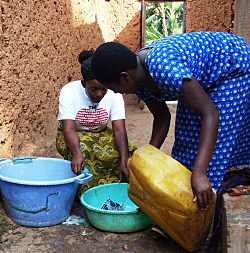
Despite hunger, HIV/AIDS, malaria, alcoholism, domestic violence and other problems, smiling and greeting visitors and villagers alike with a handshake and "murahho" (roughly "good day" in Kinyarwanda) is the norm here.
Children find delight in simple things like seeing a visitor’s face, or checking out their own faces on a digital camera. They make soccer balls with grass, ride wooden bicycles and fashion cell phones out of reeds.
They eat food from the fields around their mud brick homes cooked over wood fires.
The wood is no longer taken from the forest, but rather from “buffer zones” that have been created with fast growing trees such as eucalyptus.
Homes in Banda often consist of four or five tiny by our standards, dark rooms. The kitchen is often shared with the livestock, usually goats, rabbits or guinea pigs, with a low wall separating the cooking from the to-be-cooked.
“But they are proud to show you their homes,” Jenne says, as eleven families did on our second to the last day in town.
Ki-Yanna, who spent that afternoon hand washing, as the villagers do, the family laundry, feels the Bandans are also proud of their country and their president, Paul Kagame, who was soundly re-elected during our stay in the country.
During our week in Banda we lived without electricity, running water, or anything close to flush toilets.
“I don’t feel like we were missing anything,” Ki-Yanna says. “We had a battery. That’s a luxury,” she says referring to a huge battery that lives in the living room of Kageno guest house, where we stayed, and which powers a dim compact flourescent bulb for each room and recharges, at least during our stay, computers, Ipods, and cell phones for several days. When it dies, Jean Pierre, an invaluable handyman and caretaker at Kageno, carries it — only God knows how — up to the small hydroelectric plant on the river near the village, and recharges it.
In its introduction to volunteers, Kageno’s instructions are to sit back and be willing to see what the villagers have to offer. To not expect to build Rome at all, much less in a day.
We had come with some expectations about Rome, but in the end had to be satisfied with teaching some English, painting lovely pictures and the alphabet on the walls of the newly-built nursery school and planting fruit trees, that Levi, Kageno’s country manger, says we will eat from someday when we return.






